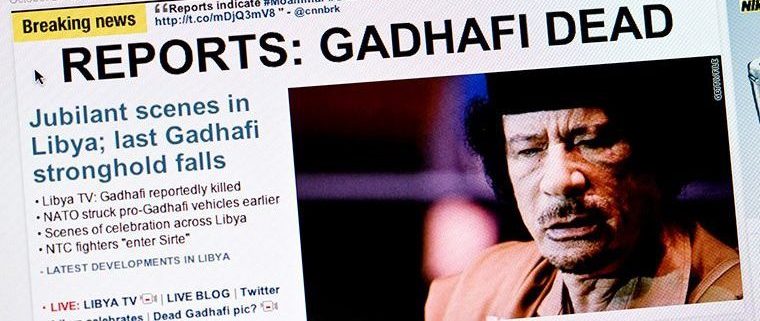A brief guide to putting America first.
The Post-Despot Democracy Dilemma

Middle Eastern despots destroyed the competing sources of authority on which new societies could be built.
The simplest explanation for the failure of democracy promotion under George W. Bush and Barack Obama is probably sufficient. Deposing the Taliban, Saddam Hussein, and Muammar Gaddafi was one thing, but creating new states capable of maintaining order and defeating enemies foreign and domestic was quite another. Where there is no state able to uphold its own security—the most basic requirement of any state—the question of regime success is moot.
As true as that is, more must be said. For decades, Iraq and Libya were seemingly secure despotisms, despite the many wars Saddam Hussein instigated and lost and the high price both countries paid for terrorism sponsored by their leaders. If despotism could succeed in establishing a degree of stability, why couldn’t democracy do so? (Afghanistan, to be sure, was semi-anarchic under the Taliban and still is.)
Despotism by its very nature involves the destruction of any alternative source of authority, with the exception, according to Montesquieu, of religious mores. The removal of a despotism thus leaves little or nothing behind from which a new society can be built. In practice, pre-political or extra-political bonds of tribe and sect survived the regimes of Hussein and Gaddafi, yet far from supplying the basis for a new political order, these are the very things over which any state must assert its superiority if it is to survive. Democracy, in particular, is incapable of taming such forces and instead becomes their captive.
Before a state can become democratic, the powers outside of politics that threaten to overawe it must be constrained. But constrained by what—or whom? By a regime that is neither despotic nor democratic, neither utterly opposed to competing powers in society nor supine before them. The precondition of democracy is oligarchy or aristocracy—a leadership class whose power is political, economic, and “social” in the broadest sense rather than tribal or religious. This class has the function of knitting together individuals while weakening, without destroying, the extra-political commitments that would otherwise endanger the state.
Such a leadership class can naturally come about in several ways. Sometimes it arises from a monarchy that has established order while tolerating the growth of subordinate authorities—allowing some citizen-subjects to become rich or distinguished in war and honor. Sometimes a weakening despotism can perhaps give rise to this, as the despot’s family and lieutenants develop into powers unto themselves. And Machiavelli suggests a way to bring the process about artificially, when a conqueror plants colonies in his new lands and even goes to live among them himself.
In the case of Germany after World War II, there remained enough memory of a lawful nation and political class before Hitler to make democratization feasible. Japan also had the necessary leadership and social conditions. In Eastern Europe and Russia, Soviet despotism failed to eradicate civil society, and when Communism faltered new civil leaders—some of whom were soft Communists themselves—could make moves toward democracy. Even so, seven decades of Communist rule had left the wellsprings of responsible leadership in Russia and parts of Eastern Europe gravely depleted.
Most of the Islamic world has suffered under far more than seven decades of despotism, and the difficulty of establishing non-despotic leadership is acute. The oligarchic element of society has to have real power; it cannot simply be endorsed by well-meaning Westerners. The trouble is that the West is at present ideologically incapable of accepting non-democratic political authority, let alone promoting such a thing. Despotism and democracy are the only terms in which a well-educated Westerner is allowed to think. But this leads Westerners, including Americans, to misunderstand even the nature of their own regimes, which are not simply democratic but a mixture of democratic mechanisms and egalitarian ideology with a certain kind of elite rule.
Four senses of democracy have to be distinguished. Elections involving a widely enfranchised public are democracy in one sense. Liberal democracy, in which individual rights and autonomy as understood by the enlightened West take priority, is another. A third sense of democracy is the egalitarian spirit described by Alexis de Tocqueville—the desire not to be subordinate to anyone else. And the fourth sense of democracy involves oligarchy tolerated by public opinion. How these four kinds of democracy clash or harmonize is the story of whether a modern democratic regime stands or falls.
Elections are not a guarantee of liberal outcomes. The desire not to be subordinate is not the same thing as embracing liberal ideals and may express itself in ways that go beyond electoral formalities. The Arab Spring and the presidentialist regime of Recep Tayyip Erdogan in Turkey both reflect the power of the democratic spirit, for good or ill, in the Islamic world. In America, a liberal democratic elite—an oligarchy whose ideology is not altogether accepted by the public—relies on egalitarian rhetoric to justify its power. But elections have repeatedly belied this ideological elite’s claim to democratic legitimacy: we can’t export what we no longer produce.
An aristocracy or an oligarchy can serve a society well. What Iraq, Afghanistan, and Libya need is a ruling class worthy of the name; elections cannot create such a class ex nihilo. Those lands may indeed have a democratic aspiration, but the formal democratic mechanism of elections, or even the rule of law (enforced, if it exists at all, by foreign troops), does not suffice to connect democratic aspiration to responsible elite leadership.
What is true for those strife-torn lands is true here as well: a democratic spirit can be reconciled with a ruling elite, but for such a thing to occur, the ruling class must be for the people and their interests, not just elected by the people, as liberal democrats sometimes are; and in a cultural sense it must be of the people—neither a foreign-appointed elite nor a self-alienating native one that deplores its own countrymen.
The American Mind presents a range of perspectives. Views are writers’ own and do not necessarily represent those of The Claremont Institute.
The American Mind is a publication of the Claremont Institute, a non-profit 501(c)(3) organization, dedicated to restoring the principles of the American Founding to their rightful, preeminent authority in our national life. Interested in supporting our work? Gifts to the Claremont Institute are tax-deductible.
To rethink American foreign policy, we must recover the principles and purpose of American government.
The hard lessons of neoconservative foreign policy's failure.



